Tuesday, 10 July 2007
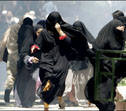 "It could end with them all coming out or it could end in a bloodbath," Stephen Cohen, South Asia expert at the Brookings Institute in Washington, said on Monday, July 9. Then at 4 AM on Tuesday, Pakistan time, Major-General Waheed Arshad announced that Pakistani forces had "launched an operation ... to clear militants" from the Lal Masjid or Red Mosque, in the capital city of Islamabad, "after talks to end a week-long standoff broke down." By 10:45 AM, EDT Tuesday, here in North America, the Associated Press was reporting that the chief cleric of the Red Mosque Abdul Rashid Ghazi had "died in fighting ... that left about 50 militants and eight soldiers dead." [SEE UPDATE BELOW FOR LATEST NUMBERS.] For the moment at least it seems that Pakistan might be an unexpected key to some next wave of who knows just what in the Middle East. And if this is even half true, it could take us all the way back 60 years, to when Pakistan itself and much else in the wider region today officially began. History, as the poet says, "has many cunning passages." "It could end with them all coming out or it could end in a bloodbath," Stephen Cohen, South Asia expert at the Brookings Institute in Washington, said on Monday, July 9. Then at 4 AM on Tuesday, Pakistan time, Major-General Waheed Arshad announced that Pakistani forces had "launched an operation ... to clear militants" from the Lal Masjid or Red Mosque, in the capital city of Islamabad, "after talks to end a week-long standoff broke down." By 10:45 AM, EDT Tuesday, here in North America, the Associated Press was reporting that the chief cleric of the Red Mosque Abdul Rashid Ghazi had "died in fighting ... that left about 50 militants and eight soldiers dead." [SEE UPDATE BELOW FOR LATEST NUMBERS.] For the moment at least it seems that Pakistan might be an unexpected key to some next wave of who knows just what in the Middle East. And if this is even half true, it could take us all the way back 60 years, to when Pakistan itself and much else in the wider region today officially began. History, as the poet says, "has many cunning passages."
Two different current narratives on what it means for us...
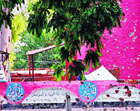 In the interests of logical clarification, you might assume at least two different broad views of just what the tragedy at the Red Mosque in Islamabad means for us. In the interests of logical clarification, you might assume at least two different broad views of just what the tragedy at the Red Mosque in Islamabad means for us.
(Where we are ordinary voters of broadly "liberal" democratic views in North America, say — progressive and/or conservative. I.e. "we" are not against any religion but do oppose theocracy — Christian, Hindu, Islamic, Jewish, or whatever. And we will resolutely stand up against terror to achieve political and/or religious ends. Especially when used against us.)
(1) PRESIDENT MUSHARRAF KNOWS WHAT HE IS DOING AND HAS FINALLY DONE GOOD. On this view the supporters of Abdul Rashid Ghazi holed up in the Red Mosque were Islamist extremists, trying to spread more of their theocratic terror in northern Pakistan all too close to the Afghanistan border. By finally using his security forces to stamp these theocratic extremists out, President Musharraf has shown he really is on the side of the angels (certainly as such things are understood in "the West," broadly speaking again).
 In the real world of course all this is complicated by various crucial nuances. For some sense of what these are consult the well-seasoned wisdom of the BBC website, e.g. : "Security forces began a full-scale siege of the Lal Masjid last Tuesday, not long after mosque students abducted seven Chinese workers they accused of running a brothel ... Public anger in the capital had been mounting for months after they [i.e. the mosque students] kidnapped policemen as well as people they considered to be involved in immoral, un-Islamic activities ... The BBC's M Ilyas Khan in Islamabad says the military operation is a gamble for President Pervez Musharraf who risks a backlash from supporters of those inside the mosque ... In recent days the army has redeployed thousands of troops in north-western Pakistan where pro-Taleban militants opposed to President Musharraf have been carrying out a string of attacks said to be linked to the mosque siege." In the real world of course all this is complicated by various crucial nuances. For some sense of what these are consult the well-seasoned wisdom of the BBC website, e.g. : "Security forces began a full-scale siege of the Lal Masjid last Tuesday, not long after mosque students abducted seven Chinese workers they accused of running a brothel ... Public anger in the capital had been mounting for months after they [i.e. the mosque students] kidnapped policemen as well as people they considered to be involved in immoral, un-Islamic activities ... The BBC's M Ilyas Khan in Islamabad says the military operation is a gamble for President Pervez Musharraf who risks a backlash from supporters of those inside the mosque ... In recent days the army has redeployed thousands of troops in north-western Pakistan where pro-Taleban militants opposed to President Musharraf have been carrying out a string of attacks said to be linked to the mosque siege."
As the BBC further advises: "For two decades, the Pakistani security establishment has been heavily involved in raising and sustaining a militant infrastructure of Islamic fundamentalist groups ... This infrastructure was used as a policy tool to safeguard the country's security interests in Afghanistan and India, supporting the Taleban in Afghanistan and militant groups in Indian-administered Kashmir ... The policy has spawned a whole generation of Pakistani youth deeply sympathetic to Islamic causes around the world ... It has also created tensions in Pakistan's foreign and domestic policies. President Musharraf lays great emphasis on the need for a modern, liberal society on the one hand, while preserving the country's policies towards India and Afghanistan — supported by many Islamic hardliners — on the other."
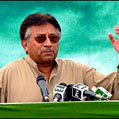 Finally: "Many analysts believe that a real shift in favour of liberal forces cannot take place without a critical evaluation of the country's policy towards Afghanistan ... Such a shift presupposes some fundamental social and political initiatives on the part of the government to pave the way for fair elections, full democracy and accountability ... That would also assume a stepping back by the military from its dominant role in Pakistan's political life ... One indication of whether General Musharraf intends to head in this direction would be if he orders an open inquiry into how and why the Red Mosque tragedy came about." (And note here that in 1999 Pakistan Prime Minister Nawaz Sharif was overthrown in a military coup led by General Pervez Musharraf, who in 2001 dismissed the president and named himself to the post, and then in 2002 won a referendum ensuring himself 5 more years in office.) Finally: "Many analysts believe that a real shift in favour of liberal forces cannot take place without a critical evaluation of the country's policy towards Afghanistan ... Such a shift presupposes some fundamental social and political initiatives on the part of the government to pave the way for fair elections, full democracy and accountability ... That would also assume a stepping back by the military from its dominant role in Pakistan's political life ... One indication of whether General Musharraf intends to head in this direction would be if he orders an open inquiry into how and why the Red Mosque tragedy came about." (And note here that in 1999 Pakistan Prime Minister Nawaz Sharif was overthrown in a military coup led by General Pervez Musharraf, who in 2001 dismissed the president and named himself to the post, and then in 2002 won a referendum ensuring himself 5 more years in office.)
(2) PRESIDENT MUSHARRAF IS IN BIG TROUBLE AND RUNNING SCARED. On another much darker scenario, the nuances in the optimistic view finally overwhelm all shreds of hope for any kind of "real shift in favour of liberal forces" in Pakistan today.
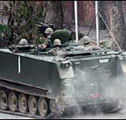 This view is explained with some chilling precision (as well as perhaps rather excessive gloom) in a US blog linked to the Washington Post: This view is explained with some chilling precision (as well as perhaps rather excessive gloom) in a US blog linked to the Washington Post:
"To the extent that the Red Mosque could become the Pakistani militant equivalent of the Alamo ... then nothing good can come of this ... Musharraf has been on thin ice since appeasing the Taliban by ceding Waziristan and other areas of tribal NW Pakistan. Today there was another failed assassination attempt that ‘came very, very close to taking him out.’ Denials aside, gunmen fired on Pakistan President Pervez Musharraf's plane using an improvised Taliban-style anti-aircraft gun after it took off from a military airbase on Friday ...
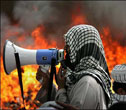 "So what we have here dear readers is a another failed regime, our ‘ally’ in the War on Terror, a military dictator turned terrorism fighter who is fast losing control of his country ... and we must remember that Pakistan is a nuclear power ... While some people ponder or worry about Iraq and whether its conflict can be won, few are watching as the Taliban-al Qaeda alliance continues to gain terroritiry in Pakistan and come closer to destabilizing that region further ... A Taliban-al Qaeda controlled nuclear capability in Pakistan not only bodes ill for the West in its fear of a terrorist nuclear attack, but must also create shudders of fear in neighboring India." "So what we have here dear readers is a another failed regime, our ‘ally’ in the War on Terror, a military dictator turned terrorism fighter who is fast losing control of his country ... and we must remember that Pakistan is a nuclear power ... While some people ponder or worry about Iraq and whether its conflict can be won, few are watching as the Taliban-al Qaeda alliance continues to gain terroritiry in Pakistan and come closer to destabilizing that region further ... A Taliban-al Qaeda controlled nuclear capability in Pakistan not only bodes ill for the West in its fear of a terrorist nuclear attack, but must also create shudders of fear in neighboring India."
Short and not so happy historical background to Pakistan today ...
 What are we ordinary voters in North America to make of all this? One now almost forgotten virtue of political history is that it ought to help bring some sobriety and more stable good sense to judgements about the present — and the future too. What are we ordinary voters in North America to make of all this? One now almost forgotten virtue of political history is that it ought to help bring some sobriety and more stable good sense to judgements about the present — and the future too.
So in spare moments over the past number of days we counterweights editors have been studying the history of Pakistan as we know it today. Without going into a lot of detail, we found that the more we learned about the Pakistani past, the (at least somewhat) less pessimistic we became about what seems to be happening now.
FOUNDING MOMENTS
To start with, Pakistan as we know it today began as "West Pakistan" on August 14, 1947, when the British dissolved their old Raj in India (the "jewel in the crown" of the "empire on which the sun never dared to set") into the two new independent self-governing dominions of India and Pakistan. Both dominions soon enough became republics (India in 1950 and Pakistan in 1956). But both republics also remained in the quite vague Commonwealth successor of the old British empire, like Australia, Barbados, Canada, Jamaica, and so forth.
Not all that surprisingly from both geographic and cultural points of view, however, in 1971 "East Pakistan" (on the other side of India) became the independent republic of Bangladesh, and only West Pakistan carried on as Pakistan (see map below). In 1972 this Pakistan as we know it today withdrew from the Commonwealth when some member states recognized Bangladesh. But in 1974 Pakistan itself granted diplomatic recognition to Bangladesh, and in 1989 it rejoined the Commonwealth.
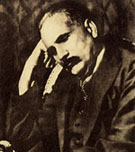 Why was it necessary to divide (or "partition") the old British Raj into two new national states of India and Pakistan in 1947 anyway? Why is there not just one independent Republic of India today, covering all of what are now Pakistan, India, and Bangladesh? The answer of course goes straight to the heart of the multidimensional political conflicts that engulf the Middle East (and now much of Europe, North America, and beyond) today. The Muslim minority feared that the Hindu majority in the old Raj would dominate the new independent India — and repress the Muslims (who had in fact been the most recent minority rulers of much of India just before the British, as in the Mughal Empire, 1526–1761). Why was it necessary to divide (or "partition") the old British Raj into two new national states of India and Pakistan in 1947 anyway? Why is there not just one independent Republic of India today, covering all of what are now Pakistan, India, and Bangladesh? The answer of course goes straight to the heart of the multidimensional political conflicts that engulf the Middle East (and now much of Europe, North America, and beyond) today. The Muslim minority feared that the Hindu majority in the old Raj would dominate the new independent India — and repress the Muslims (who had in fact been the most recent minority rulers of much of India just before the British, as in the Mughal Empire, 1526–1761).
More exactly, you might say, Muslim political leaders in India during the later generations of the Raj, and many of their followers, wanted what finally became known as the Islamic Republic of Pakistan to succeed the British empire in their part of the Indian subcontinent. Or as explained by a private Pakistan tourism website based in the UK: "The concept of a separate Muslim ‘nation’ or ‘people,’ qaum, is inherent in Islam, but this concept bears no resemblance to a territorial entity. The proposal for a Muslim state in India was first enunciated in 1930 by the poet-philosopher Muhammad Iqbal, who suggested that the four northwestern provinces (Sindh, Balochistan, Punjab, and the North-West Frontier Province) should be joined in such a state."
ISLAM AND DEMOCRACY
 Since 1947 India has gone on to become the world’s often celebrated most populous and certainly most humanly complex democracy. While India’s democratic record has had its ups and downs, from the vantage point of 2007 it has on the whole proved remarkably stable and impressive for 60 years or a full two generations now. Democracy in the Islamic Republic of Pakistan, on the other hand, has shown itself to be a much more fragile flower. Since 1947 India has gone on to become the world’s often celebrated most populous and certainly most humanly complex democracy. While India’s democratic record has had its ups and downs, from the vantage point of 2007 it has on the whole proved remarkably stable and impressive for 60 years or a full two generations now. Democracy in the Islamic Republic of Pakistan, on the other hand, has shown itself to be a much more fragile flower.
Again too many details would be too tedious here. (Those more deeply interested can consult, e.g., a helpful sample of the Encyclopedia Britannica Online on Pakistan history.) It is enough to point out the current quasi-military-dictatorship of General/President Musharraf as a case in point. (While also noting, on the more optimistic side, that the Musharraf regime is supposed to have something of an expiration date this year. And Pakistan’s democratic political parties have just concluded a conference about what might come next, held in the old imperial metropolis of London, England, which also remains the traditional heartland of Westminster parliamentary democracy — as well as a target for Islamic extremist terror!)
You might rather critically say that Pakistan’s political record compared with that of India over the past 60 years shows just how much of a challenge the concept of a uniquely Islamic republic presents for aspiring new democracies in the rising new global village, which all of us must somehow manage to live in during the 21st century.
From a more positive standpoint, however, you could also say that Pakistan has struggled with the unique challenges of creating some kind of liberal democratic version of an Islamic republic for two generations now. And it is still too early to say that its struggle has been hopeless. From this standpoint it was encouraging to see and hear former Pakistan prime minister Ms. Benazir Bhutto voice some measured support for current President Musharraf’s ultimate decisive action at the Red Mosque in Islamabad, on BBC TV on the evening of Tuesday, July 10, 2007.
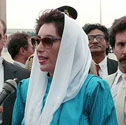 From the standpoint of the wider interests of all North American democracies today — in the US, Mexico, Canada, and the Caribbean, it would no doubt be quite helpful if there were a liberal and democratic version of an Islamic republic in the Middle East, to inspire anyone else in the region who might want to be so inspired. From the standpoint of the wider interests of all North American democracies today — in the US, Mexico, Canada, and the Caribbean, it would no doubt be quite helpful if there were a liberal and democratic version of an Islamic republic in the Middle East, to inspire anyone else in the region who might want to be so inspired.
The notion that such a place could be installed in Iraq by an outside foreign military alliance led by the US and the UK has now proved the near-insane fantasy many felt it was from the start. Hopes that somehow Iran will evolve in a more promising direction seem quixotic at best right now. But there may be some vaguely realistic chance that President Musharraf’s final decision to confront the challenge of the Red Mosque in Islamabad directly, along with all the current activities of the more liberal and democratic elements that still do survive in Pakistani politics, could be opening a few doors to fresh and more encouraging winds of change at last.
Alternatively, as some gloomy US bloggers fear, the Red Mosque may prove to be an Islamic extremist Alamo that will only lead to much worse in all of Pakistan, Afghanistan, Iran, Iraq, Lebanon, Palestine, Israel, and who knows where else? Yet the history of Pakistan over the past two generations does seem to us to suggest that this is still far from inevitable. It is hardly desirable. And until it actually does happen, if it ever does, it may be best to assume it never will.
What probably does make sense at the moment is for North American governments to pay considerably more foreign policy attention to Pakistan. Who knows? It could be at least one key to a somewhat better future. And that certainly is what the wider region needs right now.
UPDATE I : JULY 11, 11:30 PM EDT. Two more recent developments are worth noting. First, the Pakistan security forces action is now altogether complete, and there has been some initial attempt to gauge just how bloody it was.
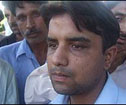 According to The Hindu in India, "nearly 40 hours after the operation began, a clear picture is yet to emerge about the number of people killed inside the sprawling premises of the mosque-madrasa complex, and whether they were all militants or if some were hostages." According to The Hindu in India, "nearly 40 hours after the operation began, a clear picture is yet to emerge about the number of people killed inside the sprawling premises of the mosque-madrasa complex, and whether they were all militants or if some were hostages."
According to the BBC website: "The Pakistani army says it has found 73 bodies inside a mosque compound in Islamabad, after fierce battles between soldiers and gunmen inside." According to the Washington Post: "Of the 164 elite army commandos who laid siege to the mosque July 3 and stormed it a week later, 10 died and 33 were wounded ... Officials indicated that most, if not all, of the 73 bodies recovered within the mosque Wednesday were those of radicals, not civilians. They would not provide a breakdown of who was killed, saying an investigation was ongoing." As to just what this magnitude of bloodiness might mean politically, the Bloomberg site says: "Pakistan Siege May Fuel Rift With Religious Parties." But the Houston Chronicle urges: "Mosque crisis may boost Musharraf's hand."
 Second, and logically enough, no doubt: "Al-Qaeda on Thursday [Pakistan time] urged Pakistanis to revolt against President Pervez Musharraf following the storming of the Red Mosque in Islamabad, in an audiotape posted on the Internet ... ‘I call upon the Ulama [Muslim clergy] in Pakistan.... Musharraf and his hunting dogs have tarnished your honour in service of the Crusaders and the Jews,’ the group's second-in-command, Ayman al-Zawahiri, said in the recording ... ‘If you do not revolt, Musharraf will annihilate you. Musharraf will not stop until he uproots Islam from Pakistan ... Muslims in Pakistan: no salvation for you except through Jihad ... Rigged elections and politics will not help you ... You should now support the mujahedin in Afghanistan ... Are there no honourable men in Pakistan?’" Second, and logically enough, no doubt: "Al-Qaeda on Thursday [Pakistan time] urged Pakistanis to revolt against President Pervez Musharraf following the storming of the Red Mosque in Islamabad, in an audiotape posted on the Internet ... ‘I call upon the Ulama [Muslim clergy] in Pakistan.... Musharraf and his hunting dogs have tarnished your honour in service of the Crusaders and the Jews,’ the group's second-in-command, Ayman al-Zawahiri, said in the recording ... ‘If you do not revolt, Musharraf will annihilate you. Musharraf will not stop until he uproots Islam from Pakistan ... Muslims in Pakistan: no salvation for you except through Jihad ... Rigged elections and politics will not help you ... You should now support the mujahedin in Afghanistan ... Are there no honourable men in Pakistan?’"
UPDATE II : JULY 12, 11:00 AM EDT. Tarek Fatah has an intriguing column in today's Toronto Globe and Mail. [Mr. Fatah, who now lives in Toronto, is "a former student activist in his native Pakistan" and "founder of the Muslim Canadian Congress."] Note, e.g.:
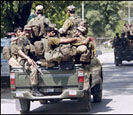 "Today, the Pakistani army will claim to have stamped out a hotbed of Islamic terrorism. Tomorrow will be another story. Abdul Rashid Ghazi will emerge as the martyr of the Islamist movement in Pakistan, and his death will become the rallying cry for the Islamofascists, not its end .. "Today, the Pakistani army will claim to have stamped out a hotbed of Islamic terrorism. Tomorrow will be another story. Abdul Rashid Ghazi will emerge as the martyr of the Islamist movement in Pakistan, and his death will become the rallying cry for the Islamofascists, not its end ..
"In the end, Gen. Musharraf was caught in his own trap. He could not put the jihadi genie back into the bottle, so he had to kill it. He may come out as a hero to the White House and to Pakistan's ruling upper-class elites, but history dictates that this will be a short-lived romance ...
"The best way to fight Islamist radicalism in Pakistan is to ask the general to step down and organize democratic elections without the aid of fraudulent voter lists that deny exiled politicians a return to the country."
UPDATE III : Jul 14, 2007 11:30 AM EDT. Today the Associated Press reported "War feared in Pakistan's rugged northwest." The item begins with: "ISLAMABAD, Pakistan – Islamic militants launched a deadly suicide attack, detonated a roadside bomb and fired rockets today as thousands of Pakistani troops deployed to the northwestern frontier to thwart the launch of a holy war, officials said.
"At least 24 soldiers were killed in the suicide attack on a military convoy, an army spokesman said. The escalating violence along the rugged Afghanistan border, a haven for local and foreign extremists, follows the government's bloody attack on Islamabad's Red Mosque which sparked calls for revenge from radical groups."
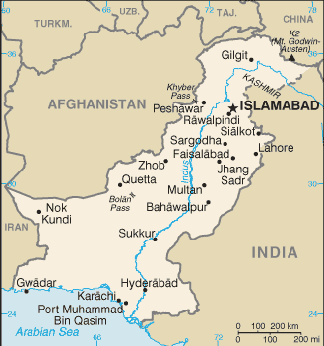
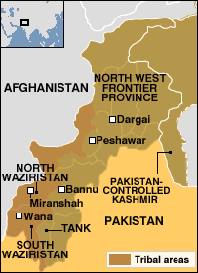
Only registered users can write comments.
Please login or register. Powered by AkoComment 1.0 beta 2!
|
